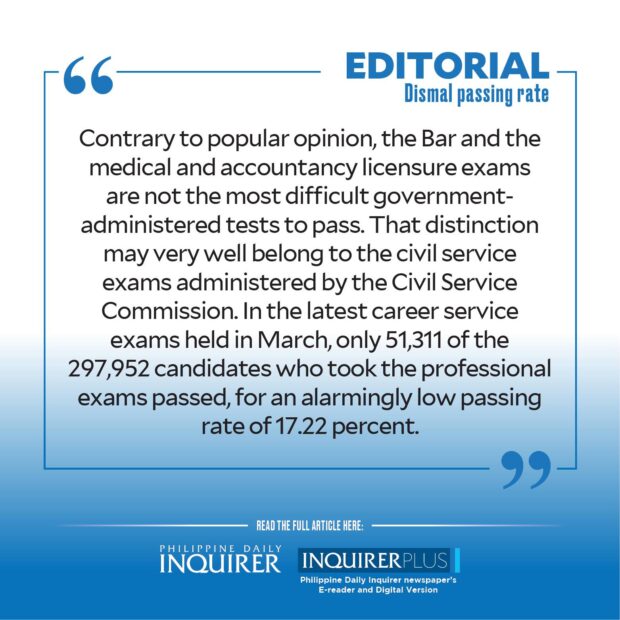Dismal passing rate

Contrary to popular opinion, the Bar and the medical and accountancy licensure exams are not the most difficult government-administered tests to pass.
That distinction may very well belong to the civil service exams administered by the Civil Service Commission.
In the latest career service exams held in March, only 51,311 of the 297,952 candidates who took the professional exams passed, for an alarmingly low passing rate of 17.22 percent. The passing rate for the subprofessional level was just as bad at 17.02 percent, as only 6,372 out of the 37,433 individuals passed.
“Dismally disappointing” was how Bohol Rep. Kristine Alexie Tutor described the passing rate, as roughly five of six flunked the exams for professionals (college graduates) and sub-professionals (undergraduates) wanting to get a permanent job in government service.
“That’s just too high a failure rate,” lamented Tutor, who chairs the House committee on civil service and professional regulation.
Basic competencies
To compare, 36.77 percent of the takers passed the 2023 Bar exams; 56 percent hurdled the 2024 exams for physicians while some 30 percent passed the May exams for certified public accountants.
Tutor stressed that the depressing exam results “confirm how all their learning before taking the exam—both academic and experiential—was far from adequate to meet the very basic competencies the exams were designed to measure.”
This means that those in government on contractual or job order arrangements are doomed to stay there as they had failed to secure “the most important item among the qualification standards for regularization in government service.”
As the CSC said, only those who pass the civil service exams are granted a civil service professional eligibility, which is among the minimum requirements to apply for permanent appointments to both first-level (clerical) and second-level (technical) positions in government service.
Given the dismal results, Tutor made the right and urgent call for the government to channel any frustration over the dismal results into immediately enacting reforms that will lead to more Filipinos passing the exams, with particular attention to those who are already in government service but are languishing in contractual posts.
Vacant plantilla posts
The government has long been criticized for employing far too many casual or contractual employees. But then it is hamstrung by the fact that far too many of these workers, especially those in the provinces, do not have civil service eligibility.
It is partly for this reason that President Marcos had to extend the contracts of the casual and job order workers in government to Dec. 31, 2025 from Dec. 31, 2024, with a direct order for government agencies to help them find permanent government posts.
As of June 30, 2023, the government has 832,812 contracts of service and job order workers, up by 22.9 percent from 642,077 workers the previous year, with the local government units employing the bulk of these workers at almost 70 percent.
They are already rendering much-needed public service but are unfortunately unable to fill the vacant plantilla posts in government because they are ineligible.
Diploma mills
Mr. Marcos was right to order agencies to help these current workers to develop the skills and capabilities, perhaps to reeducate and train them with the help of higher learning institutions so they would, at the very least, be able to take step one and pass the civil service exams.
At the same time, the Commission on Higher Education should heed Tutor’s suggestion to analyze the results of the latest exams and find out why so many examinees failed the “basic” test for aspiring public servants.
“I alert the Commission on Higher Education (CHEd) to this because of how and why college graduates fail to hurdle the very basic CSC exams. This is most probably a chronic symptom of the low standards of diploma mills in both urban and rural areas. CHEd should do data analysis to trace the alma mater of all those who failed the CSC professional exams. These diploma mills are opportunistic parasites feeding off hapless students and parents,” Tutor said.
Too many examinees failing is clearly another piece of evidence pointing to the deteriorating quality of the educational system.
This should not be allowed to continue.
In this case, passing the civil service exams for the individuals represents more than just getting the bragging rights that come with passing a government exam. Hurdling this means so much more, as it will result in a permanent job and with it added motivation and a better future for those who want to be—or already are—in public service.




















